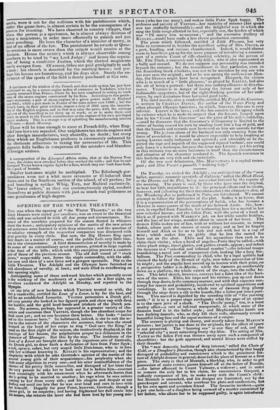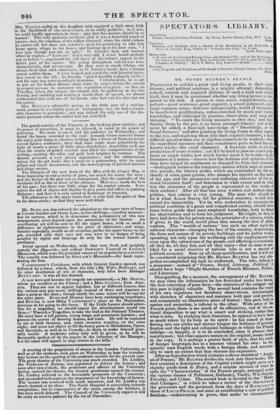On Tuesday, we visited the Adelphi ; cur anticipations of
the "new ballet, operatic, romantic spectacle of diahlerie," called the Black Hand, or the Dervise and the Pen, being somewhat lowered by the reports of the morning. The piece is said, by those who have seen the original, to bear but little resemblance to it : the principal effects and incidents, however, and (allowing for their transformation) the characters also, of
the 1Vandering Jew as performed in Paris, Me introduced. We cannot attempt to follow the intricacies of the plot. Suffice it to know, that it is a representation of the persecutions of Sadak, who has become a Dervise in consequence of the death of his beloved Azola. She, how- ever, is expelled from Paradise, for harbouring love for a mortal in her now celestial bosom ; and the fallen Peri, with the print of a hand as black as if painted with WARREN'S jet, on her white muslin boddice, and the loss of her wings, wanders about in search of her lover. 'fbe dxmon Eblis makes use of her, with or without her consent, to tempt Sadak, whose path she crosses at every step ; and at last lie forgets himself and Allah so far as to hob and nob with her in a cup of wine ; which makes him so giddy that lie lets flue sacred fire burn out on the altar. Eblis and his myrmidons then rush in to claim their victim ; when a band of angels--Pens they're called—with white plush wings, tinsel glories, and golden swords, appear; and defeat the dmmons in a "celestial and infernal combat"—the infernal troops brandishing a novel sort of transparent club, looking like a long fire- balloon. The Pen i commanding in chief, who by a legal quibble had claimed the body of the Hermit of right, now takes possession of him by might ; and the angelic host ascend up to heaven with their prize, on a perspective ladder ti-la-Martha; while the daemons go comfortably down on a platform, the whole extent of the stage, into the center be- low. This brief sketch, however, conveys but a faint idea of the busi- ness of the scene. Eblis, his imps and his victims, pop up and down through trap-doors, in the summary manner, and with that supreme con- tempt for reason and probability, incidental to spiritual apparitions and vanishings. In one instance, a whole row of dwmons drop plump through the stage down a slit in the boards, like a letter put into a post- box. This marvel is dignified by the sounding title of "the yawning earth :" it is to a proper stage earthquake what the gape of an oyster is to the open jaws of a shark. "The Devils' pomp," too, is a most motley affair—a sort of infernal masquerade, in which some of the dtemons hoof it in the ballet style ; and Mephistopheles bands out two dashing damsels, who, as they lift their veils, alternately reveal a beautiful living face and the caput inortuum of a corpse. The scenery is glaring and showy, and mostly taken from MARTIN'S pictures ; but justice is not done to the originals, for the effect of space is not preserved. The "burning sea" is one flare of red, and the "celestial city" a most uninviting frosty sky-blue. The acting of Mrs. YATES as the fallen Pen i was thrown away upon such a compound of absurdities : but the gods approved, and mortal hisses were stifled by their thunder.
The "new domestic burletta of deep interest," called the aain of Gold, or a Daughter's Devotion, though also characterized by that happy disregard of probability and consistency which is the prominent fea- ture of Adelphi dramas in general, deserved the place of honour as a first piece. The story is that of Montalt, a blackleg, who, in order to get possession of some estates, passes himself off as the father of Rosalie, —the latter affianced to Count Valmore, a widower ; and in order to remove the only bar to his claim, he commissions Gaspard, a ruffianly companion of his, to make away with the Count's child: but Montalt is unmasked, and his designs are frustrated, not by the gamekeeper and servant, who overbear his plots and confessions, but by his own agent and quondam friend. The favourite incident—quite a pet one here—of a daughter being a:mused of a murder committed by her father, who allows her to be supposed guilty, is again introduced. Mrs. YATES'S acting aa the daughter only required a little more faith in the likelihood of the occurrences, to be really pathetic ; as it was, we could hardly appreciate its force pny that fine powers should be so wasted ! The only probable incident—and it was a beautiful touch of nature—was the emotion of the ruffian Gaspard, when the child (whom he carries off, but does not murder), upon his promising to take him home again, clings to his knees, and looking up in his face says, " I love you, though you are so ugly." 0. Sairrit's look and manner when he replies—" Love tee! that's very odd, I never heard anybody say so before "--expressed the full force of the infant's appeal to the better part of his nature. His acting throughout indeed was true, characteristic, and picturesque. Be they ever so much villains, one always feels that such characters, in 0. SMITH'S hands, have a human nature within them. YATES looked and acted the cold-blooded heart- less rascal to the life : he literally "pined horribly a ghastly smile ;" and his rage was correspondingly demoniac. Unfortunately, he is apt to put on his hollow dremon smile when he comes before the curtain in proprid persona to announce the repetition of a piece : so that, on Tuesday, when, the instant the curtain fell, he glided on at the side bowing and smirking and making a dumb-show of speech, we almost confounded him with one of the fiends, who had cast his skin but not his nature.
Mrs. KEELF.Y'S admirable acting, in the little part of a waiting- maid, cannot be tco highly praised : fortunately, too, she had a reason- able character to personate ; and was indeed the only one of the dra- matis person e whom the author had not stultified.



















 Previous page
Previous page